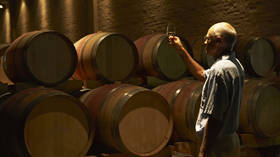EU launches crisis measures to save winemakers

The European Commission this week introduced emergency market measures to support EU wine producers, who have found themselves unable to dispose of excess stocks.
According to Friday’s announcement on the commission’s website, member states will, under national support programs, be able to include crisis distillation as a subsidised measure to remove excess wine from the market.
“The financial compensation to be granted to the wine eligible for distillation would be limited to a share of recent market prices,” the statement said.
The commission noted that the wine industry has been hit by reduced consumption due to high food and drink price inflation, which, coupled with a good harvest in 2022, has led to oversupply. The production of wine in the bloc surged 4% year-on-year in 2023, while initial stocks are 2% higher than the average for the past five years.
The commission recorded declines in wine consumption of 7% in Italy, 10% in Spain, 15% in France, 22% in Germany and 34% in Portugal. In addition, the bloc’s wine exports between January and April 2023 were 8.5% lower than in the same period of last year, which added to the surge in stocks.
“This market context is translating into sales difficulties for EU wine growers and producers, reduction of market prices and consequently, a serious loss of income especially in certain regions mostly hit by these trends. The situation is very fragmented across the EU, and the imbalance between the available supply and the demand is rather concentrated in certain regions and wines,” the commission stated, noting that the most affected are red and rosé wines from France, Spain and Portugal.
The measures adopted by the commission will be temporary and will have to be endorsed by member states. Producers will then have until October 15, 2023 to distil their excess wine. The alcohol obtained from distillation will have to be used for non-food purposes “to avoid a distortion of competition.”
For more stories on economy & finance visit RT's business section












